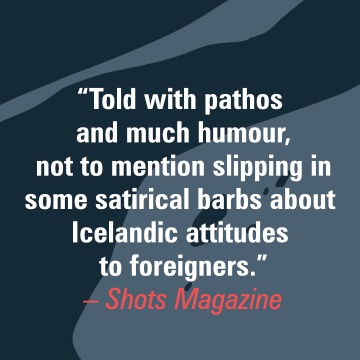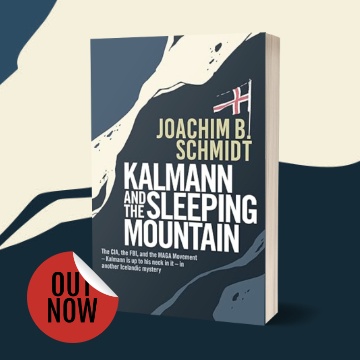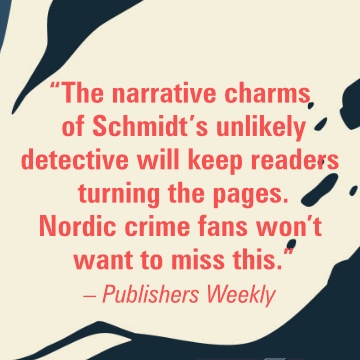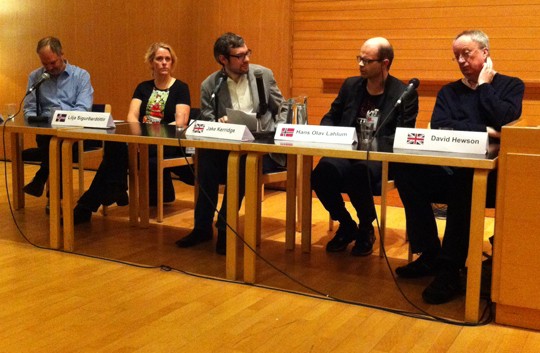
Left to right: Michael Ridpath, Lilja Sigurdardottir, Jake Kerridge, Hans Olav Lahlum and David Hewson.
Though it was 9am, the sun still hadn’t risen as Iceland Noir began this morning at the Nordic House in Reykjavik. Organised by the authors Yrsa Sigurdardottir, Quentin Bates, Ragnar Jonasson and Lilja Sigurdardottir, this year’s event has grown to a three-day affair – if you include a tour of the glacial setting for Yrsa Sigurdardottir’s My Soul to Take, which takes place on Sunday.
The author panels are as unique as the audience here in Reykjavik, with contributors traveling in from across the Nordic nations, the UK and Ireland, the US, Romania, South Africa and more.
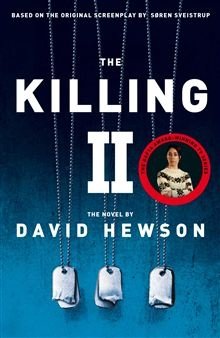 The action began with a panel on a the core topic of the conference – Nordic Perspectives. Moderated by Telegraph journalist Jake Kerridge, it brought together two Brits who have written books based in Nordic countries – David Hewson (the novel adaptations of The Killing, set in Denmark) and Michael Ridpath (The Fire and Ice series, set in Iceland) with Icelandic author Lilja Sigurdardottir and Norway’s Hans Olaf Lahlum (The Human Flies).
The action began with a panel on a the core topic of the conference – Nordic Perspectives. Moderated by Telegraph journalist Jake Kerridge, it brought together two Brits who have written books based in Nordic countries – David Hewson (the novel adaptations of The Killing, set in Denmark) and Michael Ridpath (The Fire and Ice series, set in Iceland) with Icelandic author Lilja Sigurdardottir and Norway’s Hans Olaf Lahlum (The Human Flies).
Lilja Sigurdardottir, whose book Steps begins a series in which a killer appears to be following a 12-step programme as he takes lives, talked alcoholism in Iceland as a key theme. She went on to point out that other matters are taking new prominence in Nordic crime fiction. “Two things that are problems in Iceland are the drug trade and the finance system,” she said.
Her books use character names taken from Icelandic mythology and fairy tales, but are global in scope as a drugs smuggler, customs officer and bank boss all become involved in a mysterious mix.
Michael Ridpath used to write financial thrillers but wanted to do something new and different, so created an Icelandic detective called Magnus Jonsson, an American with Icelandic heritage returning to his roots and hoping for a quiet life. Ridpath was inspired by Iceland during a book tour in the 1990s – its landscape and its people. “It is such a strange country that one wants to write about it and its oddity,” he said.
What’s interesting is that his novels, though written in English, have been translated into Icelandic. The scrutiny by native Icelanders was both exciting and scary for the author, who appeared in TV interviews and was reviewed in the press. He was commended for his research, which went as deep as reading the sagas. And, references to them can be found in his books. “When you’ve been writing about Euro bonds and junk bonds, it’s nice to read about Vikings jumping over hills and killing each other,” he said.
Critical appraisal is a double-edged sword, and Hans Olav Lahlum, who sets his novels in the 1960s. “One person came up to me and said, ‘That left-wing group that you wrote about – I was there in the 60s, and that group didn’t exist.’ A while later someone else who’d read the book told me, ‘That left-wing group, from the 60s, I think I was a member of that group.'”
Lahlum chose to set his book in the 1960s for two reasons he said. One is practical – the 20s to the 60s represent a period of classic crime and writing them doesn’t involve oodles of research on investigative and forensic techniques. However, the other reason was that the 60s was close enough to World War II for the wartime hangover to be meaningful. The whole question of neutrality, collaboration with the Nazis, and wartime occupation remains a sensitive one.
This is something that came to the fore for David Hewson, particularly when adapting The Killing II from TV to novel. “War, and occupation, it creates a sense of defeat and shame when it happens. We haven’t experienced that in the UK but it’s something that has affected many European countries,” he said.
Crime in translation
The conference rolled on into a discussion about translations chaired by Jackie Collins. This involved Icelander Viktor Arnar Ingolfsson (The Flatey Enigma), Norwegian Vidar Sundstol (The Land of Dreams), Romania’s Bogdan Hrib and Mari Hannah the UK creator of the Kate Daniels series. Handing a book that’s been worked on slavishly for a year or might sound daunting, but the authors all agreed it’s best to let go.
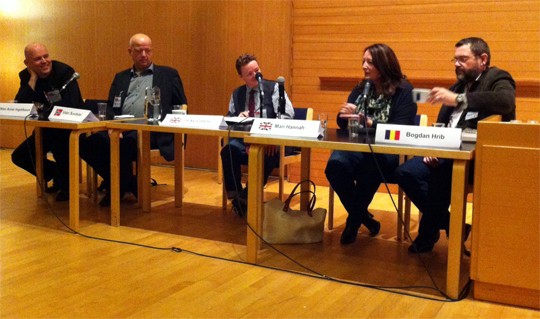
Left to right: Viktor Arnar Ingolfsson, Vidar Sunstol, Jackie Collins, Mari Hannah and Bogdan Hrib.
“The strangest thing for me was listening to an American audio book,” said Ingolfsson. “I thought, ‘Do the characters really sound like that to readers?'”
The subject of difficult Nordic names came up and Ingolfsson some great advice for his fellow Nordic authors – give each character a name starting with a different letter. That helps get around the unfamiliarity a little bit.
Humour in translation also got a thorough treatment from the panel – something for translators to watch out for. Vidar Sundstol addressed the Scandinavian quiet approach to humour. “In Norway, there is a deep and unspoken or half-spoken type of humour. It’s difficult to translate. Sometimes the humour comes in not saying something,” he said.
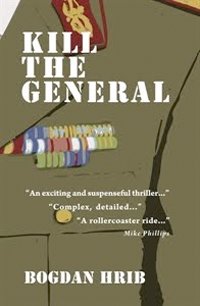 And Bogdan Hrib pulled in a Romanian perspective. “During the communist period we had a humour code. Two words can contain much more meaning – a reference – and humour.”
And Bogdan Hrib pulled in a Romanian perspective. “During the communist period we had a humour code. Two words can contain much more meaning – a reference – and humour.”
Asked which non-English markets they’d like to see her novels translated to, Mari Hannah said Norway and the Netherlands. In fact, her first book was translated to German before it appeared in English. Sundstol chose Japan because it’s such a different culture, and Ingolfsson picked Norway due to The Flatey Enigma’s connections to the country. “For me, Portugal and Spain,” said Bogdan Hrib. “Like Romania they also had dictatorships, and maybe a similar experience.”
Jackie Collins pointed out that Hrib’s book would then be available to all of Latin America. Audience size can mean a lot to bottom lines, even for authors. As I type, William Ryan is quizzing Peter James, Lilja Sigurdardottir, David Hewson and Alexandra Sokoloff.
Watch for more from Iceland Noir, including a piece on new authors.






